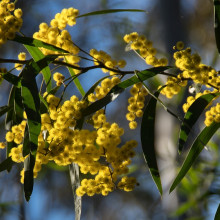Could saponins help fight coronavirus?
We've been hunting down the answer to this questions from Denise: "There are plants that contain saponins and were used by Australian aboriginal people as bush medicine. Aborginal family members in remote areas are concerned about coronavirus but do not have access to hand sanitiser or sometimes even soap. Is there any research on the antiviral properties of saponins in, for example, Australian Acacia species, or other plants?" Eva Higginbotham spoke with Maher Mohamed Abed El Aziz from the University of Tripoli in Libya, and Anthony Davenport from the University of Cambridge, to find the answer.
In this episode

00:00 - QotW: Do plants with saponins protect against viruses?
QotW: Do plants with saponins protect against viruses?
Eva Higginbotham and Afnan Azizi tackled this question from listener Denise...
Eva - Saponins are a class of naturally occurring compounds made by several different plants, including ginseng and soapbark. Some agave species are good examples for the saponin rich plants. But actually, most Australian acacia don’t contain saponins.
Afnan - Saponins have various properties, including the ability to act as surfactants. This term means something that helps substances mix together. In other words, saponins can act as soap, helping mix grease molecules with water so that they can get washed away.
Eva - This is particularly important when we think about saponins and viruses - one of the reasons we’ve been told to wash our hands so much is that viruses have a fatty membrane, which can be dissolved by even regular soap.
Afnan - Saponins, as surfactants, can break up this membrane and so in the absence of regular soap, plants containing saponins could be very useful to use as soap for handwashing. In remote small villages, Indian people still wash their clothes using saponin rich plants.
Eva - Saponins will even create a foam when shaken with water, just like regular soap. But what about using saponins as antiviral agents? Well, there has been a bit of research about this over the years.
Afnan - There’s evidence to suggest that certain saponins have antiviral activity against HIV and one version of the herpes virus. There’s even very recent work looking at a specific saponin called glycyrrhizin which comes from liquorice root. It’s been suggested that glycyrrhizin might help against the coronavirus by interacting with various important molecules present in an infection, including cytokines that are part of our immune response, and even ACE2, which is the coronavirus' entry way into our cells. However, a lot more research would be needed before we know whether saponins could actually act as a treatment or medicine for coronavirus.
Eva - Importantly, even though glycyrrhizin is natural it can have some nasty side effects and hasn’t been through any clinical trials to determine whether it works; so we don’t advise you to start chomping down on lots of liquorice just yet. Thanks so much to the experts who weighed in to answer the question this week: Maher Mohamed Abed El Aziz from the University of Tripoli, Libya, and Anthony Davenport from the University of Cambridge, and to Afnan Azizi for reading out our answer. Next week we’ll be teeing off to answer this question from Darren...
Darren - Golf balls are dimpled to disrupt the air around the ball. As far as I can gather, this reduces their drag and allows them to fly further than they would if they were perfectly round. Why do we not see dimpled cars, aircraft, and trains? If this effect is so effective for golf balls, why not use it on Formula 1 cars, for instance?
Related Content
- Previous The Fifth State of Matter
- Next 101 ways to sterilise a facemask










Comments
Add a comment